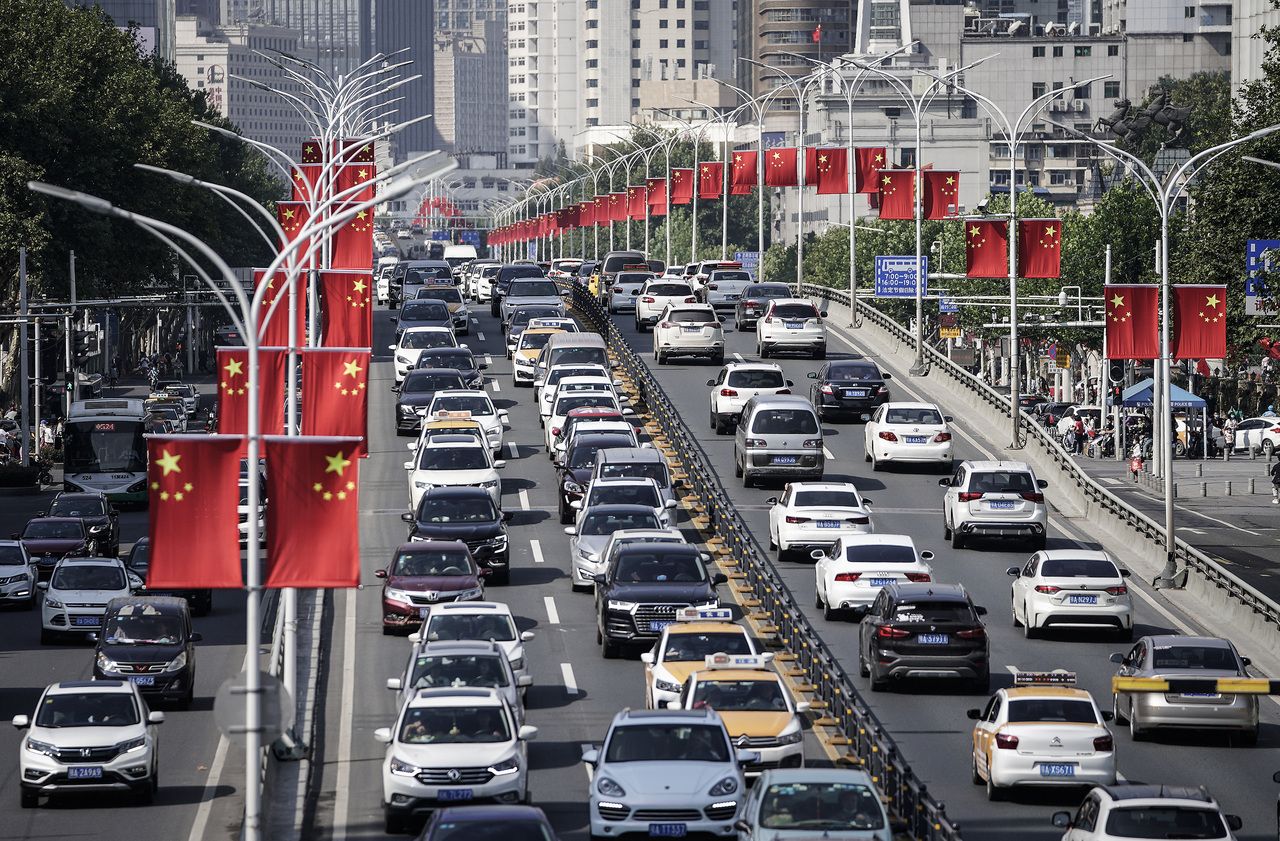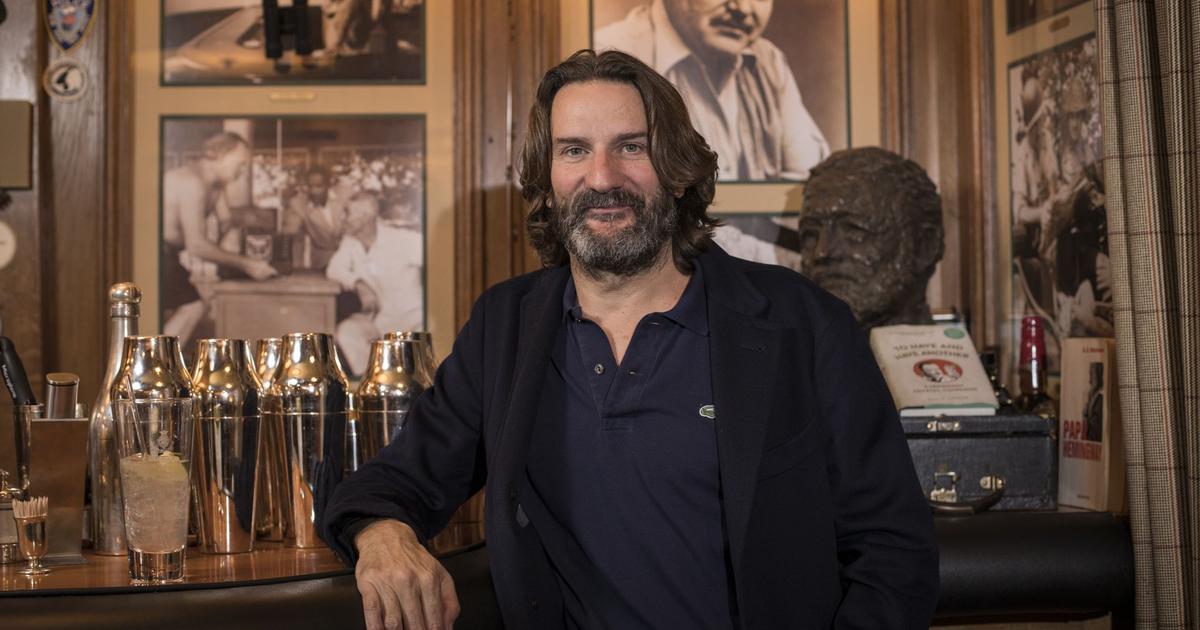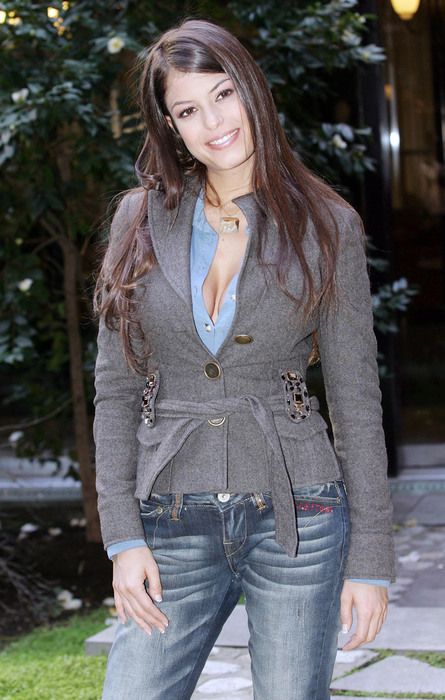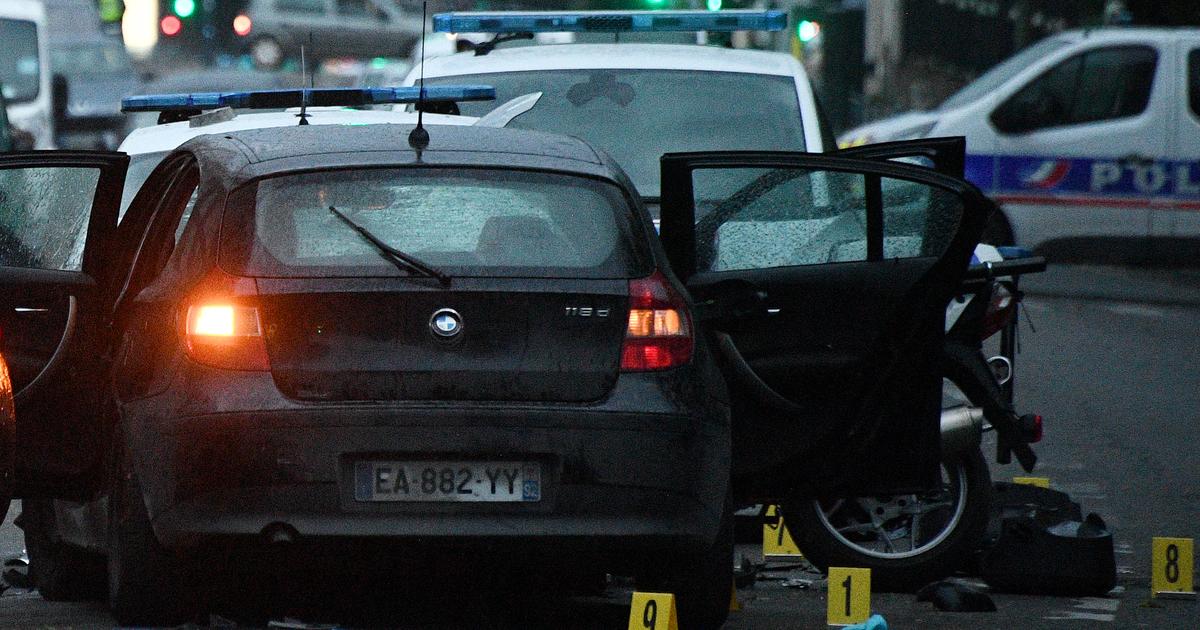These are images to make the reconfigured Europeans green with envy.
Scenes of jubilation and effusion to which they can not abandon themselves as they are faced with a new outbreak of Covid-19.
In Wuhan, Chinese cradle of the epidemic, where it seems to be under control, they have become familiar again.
Shaking themselves to the rhythm of the techno music of the guest DJ on this beautiful August evening, several thousand clubbers scream in one of the largest water parks in Asia.
Without mask.
Handy without hydroalcoholic gel.
Without social distancing.
An explosion of joy in the form of an arm of honor to the pandemic which, at the end of January, nailed the inhabitants to their apartments with often rudimentary comfort for seventy-six days.
On August 15, Wuhan Maya Beach Water Park, one of the largest water parks in Asia, was transformed into a giant nightclub.
EPA
Since the authorities tested, in the second half of May, the 11 million inhabitants of this sprawling megalopolis, reporting the control of the epidemic, the capital of Hubei province, in central China, comes out little by little from his torpor.
These young people in swimsuits, slumped on candy-pink buoys, scream at the new found freedom, at the triumph of life over death.
The party resumes its course, the daily too.
Shopping centers are swarming with people
After the sluggishness of the first months of the year, this bubbling energy once again makes the heart of the city beat faster: pedestrian paths, shopping centers and leisure parks swarm with the comings and goings of residents, day and night. .
Wuhan people no longer hesitate to sit down at a restaurant to taste local specialties, noodles with peanut sauce or duck neck, marinated and spiced.
Like Sandrine Liseron, a French expatriate who says "no longer forbid anything", city dwellers frequent cinemas, give voice to karaoke, sweat in sports centers.
READ ALSO>
Fight against Covid-19: China, South Korea, Norway ... what works elsewhere
Michel Li, a French-speaking Chinese, is delighted to be able to resume the crawl in the pool, several times a week.
And the children returned to school on September 1st.
“On the surface, people are very happy.
A bit as if they had just celebrated a great event, and not gone through a disaster, ”observes writer Fang Fang, 65, who kept a logbook during confinement, from January 23 to April 8
(Editor's note : “Wuhan, closed city”, translated from Chinese by Frédéric Dalléas and Geneviève Imbot-Bichet, Stock, 380 p., 23 euros)
.
Relieved to turn the page of these dark hours, she notes that "existence has found the animation of yesteryear".
Writer Fang Fang, 65, kept a log during the lockdown.
Getty / David Levenson
Wielding his camera to capture this surge of sap as he had immortalized the city frozen in the depths of winter, Frédéric Domeck cuts through the crowd in Hanjie Street, where streetwear stores and luxury boutiques have rekindled their neon lights.
Living in Wuhan since 2012, with his wife from Hubei, this 54-year-old French teacher even went a few days earlier to the Happy Valley amusement park, where he was taking his 9-year-old daughter.
Armed with the WeChat app downloaded to his phone, all he had to do was show his green QR code, synonymous with good health, to be allowed to enter.
This QR code, which he must fill in by submitting himself to a Covid test very regularly, is the essential key to accessing all public places.
And here, no one is moved by it: aware of the health issue and disciplined, the Chinese do not worry about the tracing of their data.
Wearing a mask is no longer compulsory.
“But 70% of people still wear it,” he says.
"It took time for the confidence to return"
Because, even if they indulge these days in a form of lightness and recklessness, the Wuhanese remain on their guard.
When the lockdown was lifted on April 8, they didn't rush out.
Too early.
Not sure enough.
The Grim Reaper had brushed against them too closely, plunging entire families into grief.
According to Chinese government figures, the Covid-19 has killed 3,869 people in the city, or more than 80% of the national death toll, which stands at 4,632 dead.
“The first words we exchanged between us were:
Finally, we survived
or
We escaped death,
” testifies Fang Fang.
Newsletter - Most of the news
Every morning, the news seen by Le Parisien
I'm registering
Your email address is collected by Le Parisien to enable you to receive our news and commercial offers.
Learn more
The trauma - which echoes that of SARS, another virulent coronavirus that appeared in China at the end of 2002 - was such that its shock wave spread until the end of the summer.
People did not resume their going out habits until September.
“My parents didn't dare put their noses outside, they still felt in danger,” says Bingtao Chen
(Editor's note: “Wuhan confidential”, by Bingtao Chen, with Stéphanie Thomas, Flammarion, 224 p., 17 euros)
, IT consultant Wuhan who lives in France.
It took a while for the confidence to return, but now everyone knows the city is safe.
"
Ultimately, it was the economic recovery that led to a return to normal in the first days of summer.
After having long hosted the only ballet of ambulances, whose sirens tore the silence at the height of the crisis, the highways have found the daily flow of vehicles of all kinds.
Pollution is again blurring the sky, so pure during confinement, and construction sites are being relaunched everywhere.
The city is preparing to inaugurate the eleventh bridge that crosses the Yangtze River, allowing to accommodate two times five lanes, and it is already planning the construction of a twelfth.
The third tallest skyscraper in the world, Tower 606, which will measure 606 meters, with an internal area of 3 million square meters, is nearing completion.
The metro network, which now has nine lines, continues to expand.
"Our turnover at the end of the year will exceed that of 2019"
Like China, in constant metamorphosis, Wuhan strongly asserts its slogan: "Wuhan, different every day!"
"" It is in perpetual construction ", describes Frédéric Briand.
Managing Director of Acome, a wiring harness company that supplies automobile manufacturers, this 47-year-old Frenchman stayed behind with his teams this winter.
As his wife and son took advantage of the second consulate-chartered repatriation flight to snuggle up in Paris, he saw the city slowly emerge from his nightmare.
“The activity started up again in June-July, almost five months after the start of confinement,” he testifies.
Frédéric Briand, director of a harness company for the automotive sector, has chosen to stay in Wuhan alongside his teams this winter.
DR
After suffering a 40% collapse of its GDP in the first quarter, the local economy, which relies mainly on the automotive sector, is now in cheeky health.
"Growth has returned to around the levels recorded at the same period last year," the authorities say.
The workers have resumed their work at the factory, where many have adopted the mask and where they continue to respect social distancing in the canteen and in the meeting room.
In decline for eighteen months, due to a drop in vehicle sales, the automotive industry is experiencing an unexpected rebound.
The workers have returned to the factories, where they are numerous to wear the mask, as in this subsidiary of the Chinese group Haier, in September.
Barcroft Media / Getty
“Our turnover at the end of the year will exceed that of 2019, enthuses Frédéric Briand.
In the last quarter, we flirt with the figures for 2018. ”Among the explanations put forward for these good results, he welcomes the“ Covid effect ”, appreciating the support of the Chinese state which has“ put the package to revitalize growth ” : subsidies intended to increase purchasing power and encourage consumption, exemption from social contributions, lower rents and electricity bills for SMEs, etc.
A "model city", a powerful vector of propaganda
Despite this new industrial boom in the capital of Hubei, which is among the top 10 most competitive Chinese cities, it was not until the “golden week” to restore Wuhan to its fullest glory.
The authorities, criticized at the start of the pandemic for not having taken the measure of it and, above all, for having concealed its dangerousness, took advantage of the seven public holidays offered each year to the population during the national holiday, the October 1, to restore their image and that of the “martyred city”.
Seeking to attract Chinese travelers, these same authorities have granted free admission to leisure sites, including the iconic Yellow Crane Tower, and invited 350 starred hotels to set up promotional rates.
A policy that pays off, since Wuhan became the first tourist destination that week, ahead of the very attractive Shanghai.
Nearly 19 million holidaymakers have thus walked the arteries of the one that the government is now erecting as a "model city of the Chinese solution to the virus", according to the expression of sinologist Jean-Philippe Béja, director of research emeritus at the CNRS.
Thanks to an attractive tourism policy, Wuhan welcomed 19 million holidaymakers who came to celebrate National Day in the first week of October.
Getty
A display case.
And a powerful vector of propaganda.
To restore their pride to the Wuhan people, stigmatized when the epidemic started to flare up in the region and to spread in the country, Beijing scripted this extraordinary health war.
An exhibition organized at Wuhan Keting - at the same place where a hospital was erected in a few days at the height of the crisis!
- praises the solidarity of the Chinese and flatters their patriotism.
We see medical beds, mannequins representing the nursing staff in white or blue overalls, perfectly equipped with masks and gloves, soldiers who rush to lend them a hand.
A total of 540,000 doctors and nurses have been mobilized to fight the pandemic in Hubei province, where there are nearly 59 million inhabitants.
Faced with this story to the glory of anonymous heroes, which salutes "a victory of the people", Frédéric Domeck, the French teacher, says he is "moved".
The government did not miss its target.
VIDEO. Coronavirus: these emergency hospitals born in the emergency
Wuhan people watch in bewilderment as the West struggles with the virus
This rewriting of history has its dark side, however, since it hides the chaotic management of the start of the epidemic and the criticisms it has aroused on social networks.
Erased, Li Wenliang.
This ophthalmologist, who died at the age of 33 after contracting Covid-19, had been sanctioned by local authorities for having alerted, in December 2019, to an unknown form of coronavirus.
Uproar on social networks.
Shaken, the regime immediately tried to rehabilitate him, recalling that he was a member of the party and raising him to the rank of "hero".
Today, his name has disappeared from official tributes.
On September 8, during a reception at the People's Grand Palace in Beijing, President Xi Jinping preferred to honor four other doctors, including Doctor Zhong Nanshan, an icon in the fight against coronaviruses.
Sent to Wuhan to correct the mistakes of the local government at the start of the pandemic, he was the chief soldier in the health battle.
“We believed that China was going to experience a political earthquake comparable to what Chernobyl was for Russia,” analyzes Jean-Philippe Béja.
It has not happened.
By managing to bring the epidemic under control, the regime even strengthened its credibility, which was in the process of withering.
Today, he prefers to forget Li Wenliang, who is a stone in his shoe, to highlight the party's success and claim the superiority of the Chinese model.
"
A message well received by Wuhan people who watch, bewildered, the West grappling with the virus, the second wave of which could be even more deadly than the first.
"When I see the images of people celebrating in Europe and who are in the street as if nothing had happened, I do not understand, wonders Emilie Xu, dance teacher in Wuhan.
The Covid is very dangerous, you must not leave your home until it is over!
"
Based in Paris, but still connected to the capital of Hubei where his parents live, Bingtao Chen shares his emotion.
However, he weighs: “The culture of France is freedom.
You, you want to enjoy life when we cherish it.
In China, catastrophes are still engraved in our flesh: the great famine of 1960, SARS in 2002… ”It was during this crisis, which did not affect Europe, that the Chinese developed their system of strict containment, tracing of suspected cases and isolation of sick people.
Not as idyllic as it looks
Different experiences, and a clash of civilizations.
But China's undeniable success in the face of the pandemic has not come without pain and damage.
The postcard of the “next world” that she sends back to us is perhaps not as idyllic as it seems.
The cries of those who mourn their loved ones and demand accountability no longer find an echo.
Their approaches to the Wuhan Intermediate Court are met with deafness from the local authorities, who condemn them to silence.
The two “citizen” journalists, Chen Qiushi and Fang Bin, who dared to challenge them at the start of the crisis, are still missing.
The thirst for freedom of expression, manifested by Wuhan people in January-February, remains unquenchable.
"People want more, it has left its mark," said sinologist Jean-Philippe Béja.
The city still bears the scars of the pandemic.
The fourteen gymnasiums requisitioned during the epidemic peak are being repaired.
It is necessary to redo the parquet, damaged by the incessant comings and goings of the nursing staff.
While they no longer take in any sick, the two field hospitals, built in just a few days, are left as they are.
In case…
The Huanan wholesale market, where seafood and exotic animals were sold, including the pangolin incriminated at the start of the epidemic, is doomed.
Presumed starting point of the Covid-19, now hidden behind blue barricades, it has been closed by the authorities.
Because it recalls the vulnerability of the regime, this symbolic place will soon be razed.
No covered market has been authorized to reopen.
The suspected starting point of the pandemic, the Huanan wholesale market, where seafood and exotic animals were sold, will soon be razed.
AP / Sipa / Dake Kang
“Real estate is taking a hit.
In the Huanan district, prices have collapsed, ”says Michel Li, a 40-year-old Chinese who works for a French company specializing in mobility.
Small businesses are also affected.
Curtains down, some stores have gone bankrupt while others have reduced their surface area in order to reduce their rent.
“The children's clothing store next to my house has divided its sales area by two,” reports Frédéric Domeck.
Few of the French have returned to Wuhan
Without social protection, health insurance or unemployment insurance, the most precarious inhabitants are struggling to recover from the crisis.
If the state took charge of medical care related to Covid at the height of the pandemic, people had to manage to pay their rents and their shopping baskets, delivered to their homes at exorbitant prices during confinement.
Manager of a studio that she rents to give her dance lessons, Emilie Xu quickly exhausted her savings account.
“I was very lucky,” says the 29-year-old from Hubei.
A Belgian friend helped me financially and I was able to resume my activity in the fall.
But I only have six French students left, whereas they were thirteen last year.
"
This is another aspect of this unprecedented crisis: massively repatriated at the start of the year, few French people returned to Wuhan.
The community in Hanyang, in the south of the city, is halved compared to 2019, when they were still 400. Renault took advantage of the pandemic to close its only Wuhan factory.
Married to a Peugeot executive, which has three assembly sites in the megalopolis, Sandrine Liseron has chosen to renew her Chinese visa at the end of July.
"We found our house as we had left it in January, with the Christmas decorations still hanging on the walls, and our cat, whom neighbors fed while we were away," says this mother of four children, whose the last two were born in Wuhan.
But life, in this French residence where only 10% of the apartments are occupied, does not quite have the same flavor.
Especially with the closure of the external borders, decided by the Chinese government in early November, Sandrine already knows that she will not be able to travel at Christmas.
“It's going to be hard not to see the family again,” she says.
This pandemic, we have been in it since last January and we have the feeling that, wherever we go, it always ends up catching up with us.
"
"The Chinese are afraid of us"
Like her, Frédéric Briand has decided to stay in China, a new perimeter of confinement that does not say its name.
Because going out is taking the risk of not being able to come back.
“I made a round trip in August to pick up my wife and my son in France,” he explains.
On the way there, I had no problem entering French territory, but on the way back, to China, it was a real pain!
After landing with his family in Shanghai, all three negative for a Covid test carried out less than forty-eight hours before their flight, they were picked up by the authorities who locked them up, the time to complete their fortnight, in a apartment with lock connected to the police!
"It's a real prison: if we open the door, they know it and fall on us", launches the entrepreneur, who prefers to laugh.
Morning and evening, officials in "cosmonaut outfit" came to take their temperature.
“By the fifteenth day, I couldn't take it anymore!” Exclaims Frédéric.
It was raining, but I went out for a run.
I needed to get some fresh air, to find my freedom.
"
In China, freedom is a relative value.
We prefer security.
Faced with the danger, now identified as coming from outside - the only proven cases of Covid-19 in recent months, in Wuhan, are all imported cases - the country is closing in.
“The Chinese are afraid of us now,” remarks Sandrine.
When they see us coming, they quickly put their masks back on and keep a distance.
"
Anxious to avoid an epidemic rebound, the State strictly applies its protocol.
A Frenchman who returned with his family a few weeks ago paid the price.
While their test was negative on boarding, a new test on landing in Wuhan was positive for the 3-year-old girl.
"The officials isolated her for three weeks, with no possible contact with her parents, not even on the phone!" Sandrine indignantly.
They took good care of her, but it's hard anyway… ”
The price to pay, perhaps, for life to return to its normal course.
And that young people can once again waddle and embrace, without masks, in a water park transformed into a disco on a summer evening.









